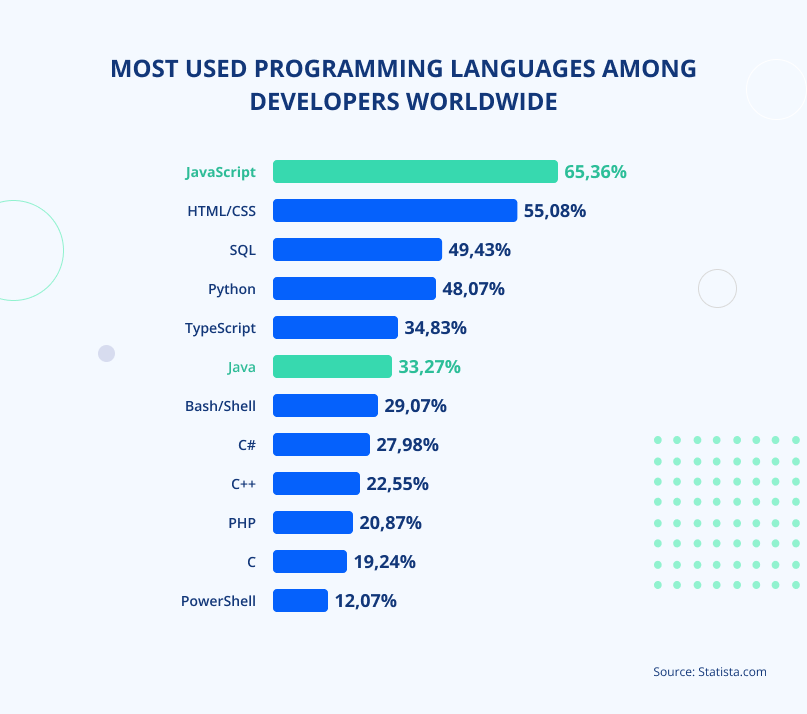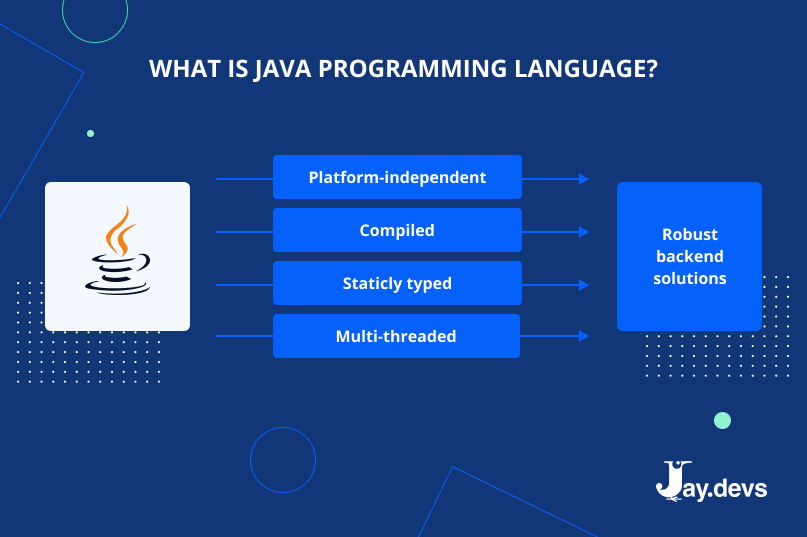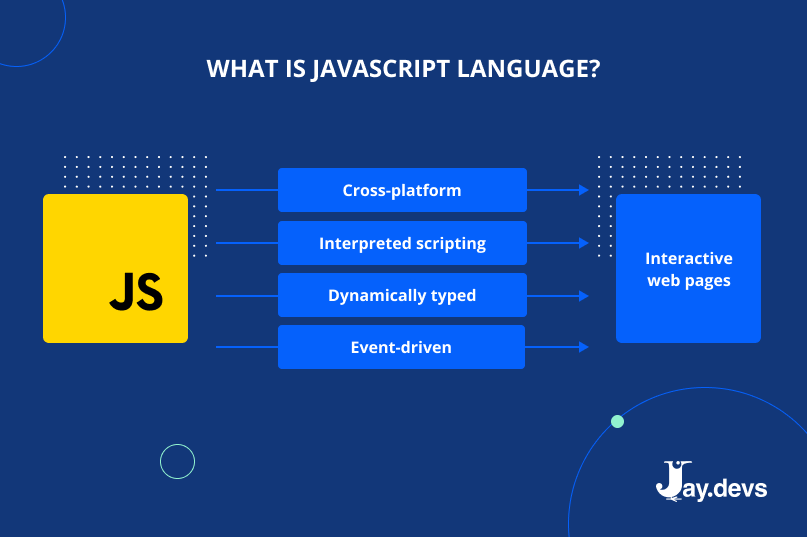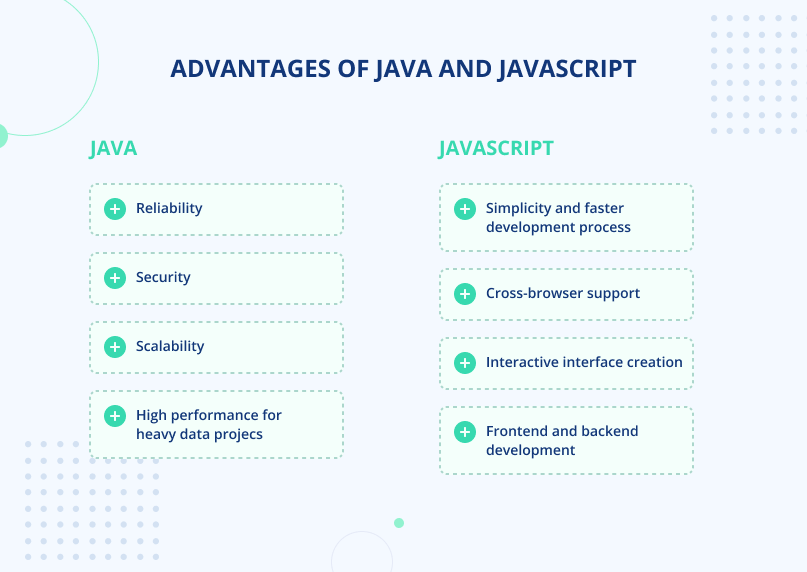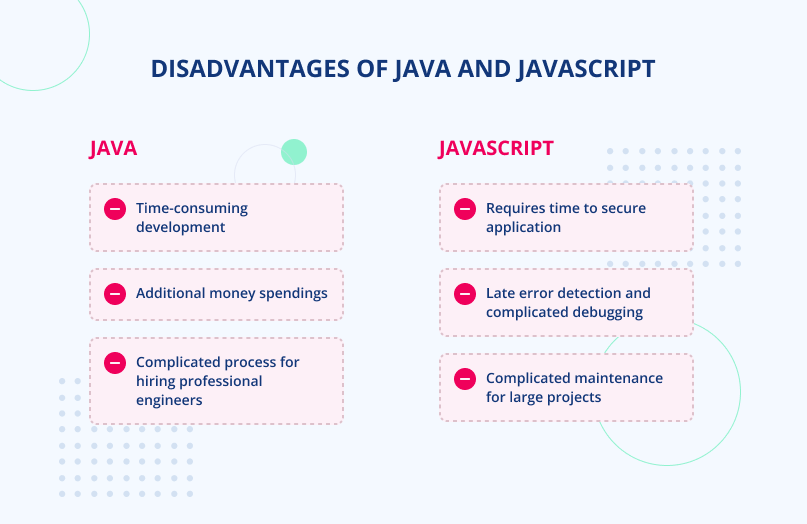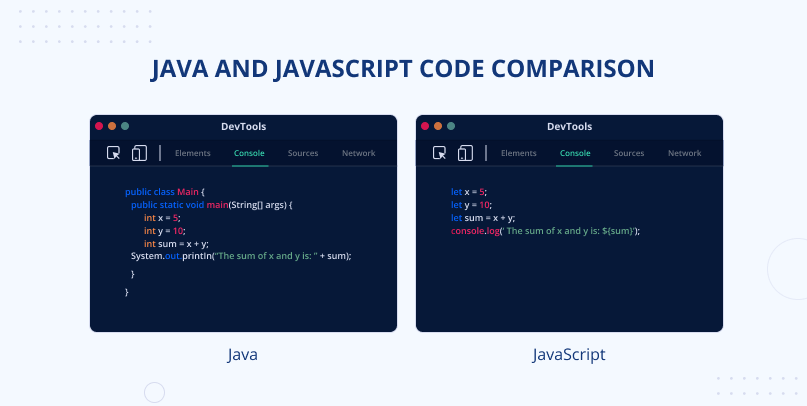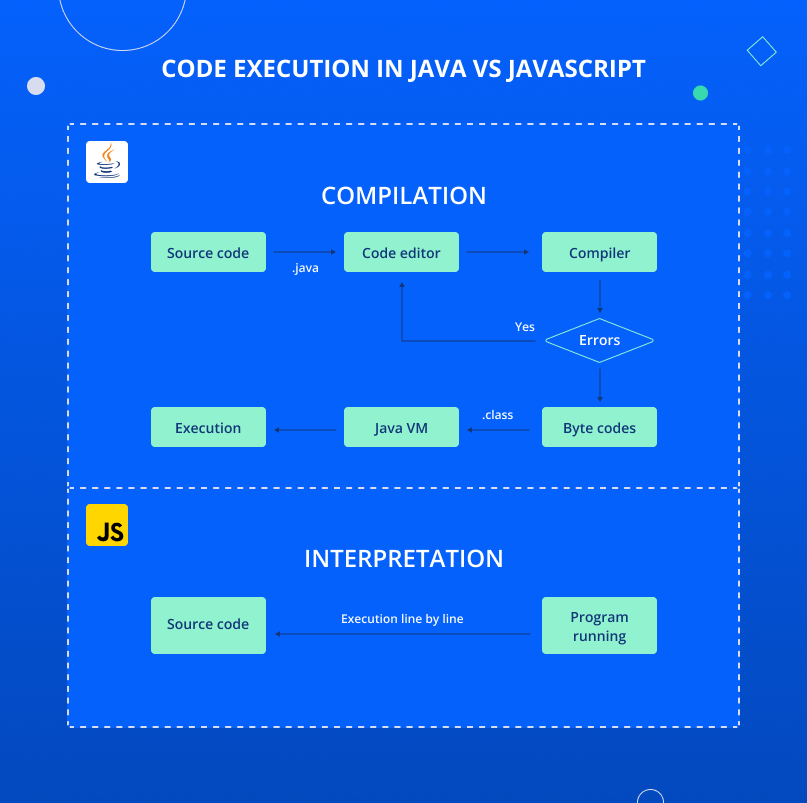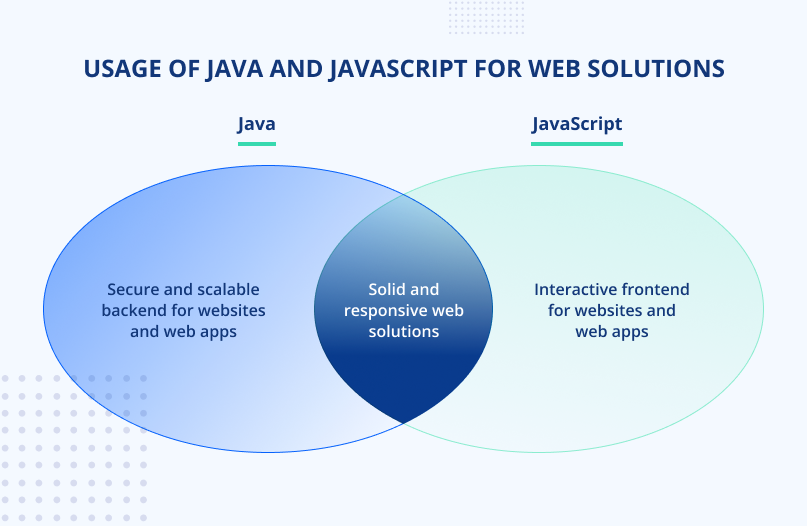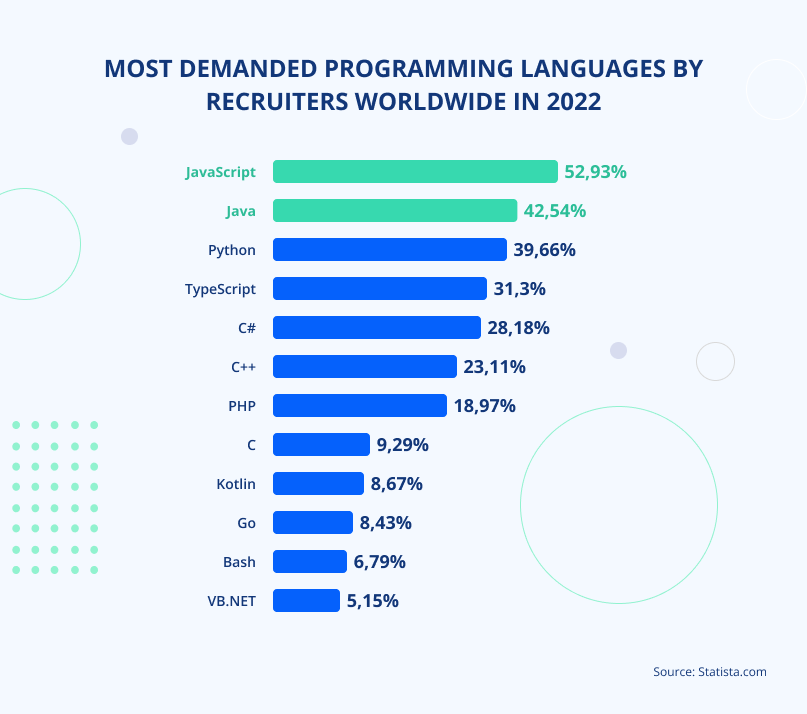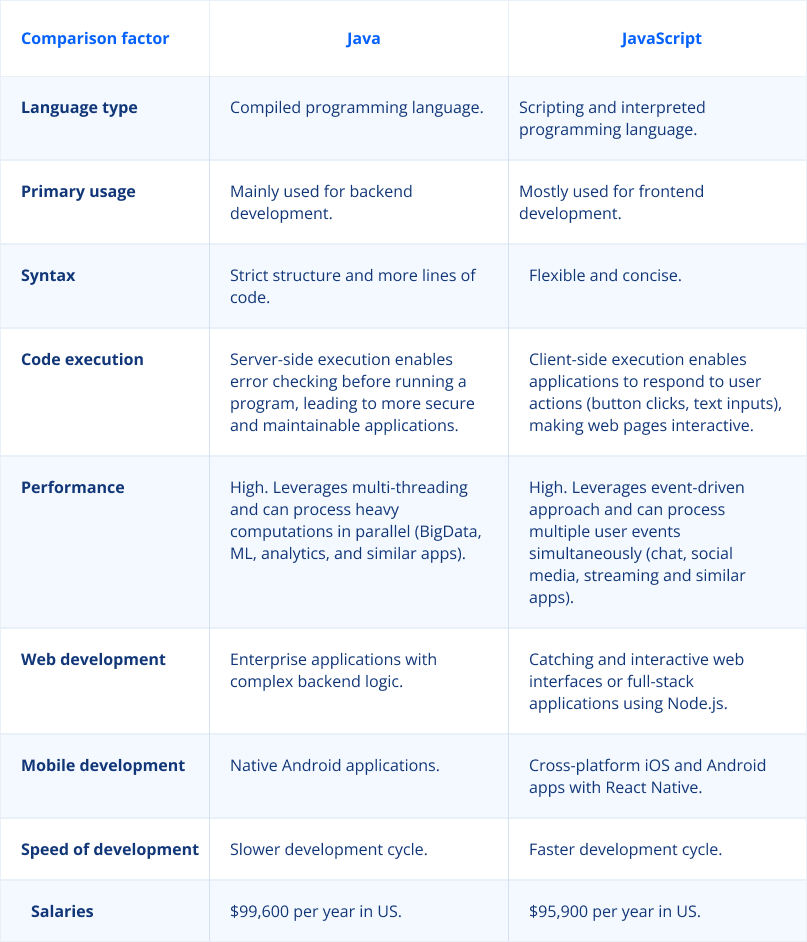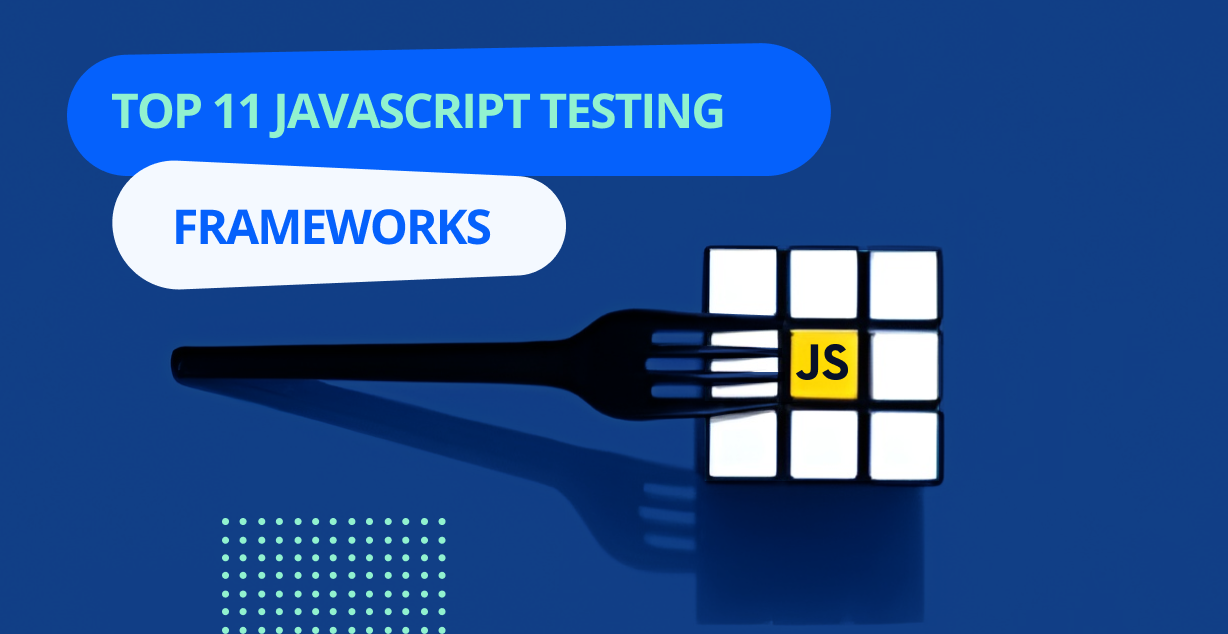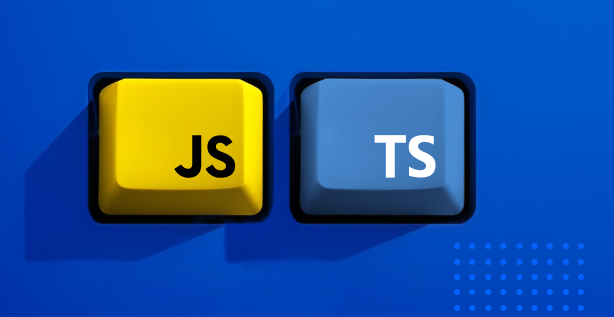Java and JavaScript are popular programming languages that often get confused with one another. Are Java and JavaScript similar? Mostly in their names, as both languages have distinct origins and purposes.
Java is a general-purpose programming language for building backend applications, while JavaScript is a frontend language for adding interactive elements to web pages.
This article provides a detailed comparison of Java vs JavaScript, including their features, similarities, advantages, and drawbacks. In this guidance, we’ll define the difference between Java and JavaScript to help you make an informed decision for your next project.
What is Java?
Java is an object-oriented programming language publicly released in January 1996 and actively applied for backend development. It powers 4.7% of websites and is employed by global brands like LinkedIn, Hulu, and Adobe.
This programming language is also extensively applied for mobile development, as it is the fundamental technology for native Android apps. Some well-known mobile applications include WhatsApp, Spotify, and Uber.
Features of Java
- Platform-independent. The “Write once, run anywhere” principle enables developers to use the same source code across web, mobile, and desktop applications.
- Compiled Language. Java code is translated into machine code by a compiler. Once compiled, applications can run on any device with a Java Virtual Machine installed.
- Static Typing. Java requires developers to declare the data types of variables used in a program. They are checked before runtime and prevent unwanted values from being used, thereby improving code quality.
- Multi-threading. Multiple threads allow multiple tasks to be performed concurrently within Java programs. This feature is aimed at responsiveness for heavy operations occurring in BigData, machine learning, or gaming apps.
What is JavaScript?
JavaScript is a popular scripting language created in 1995 to make static web pages interactive. Today, it’s the most widely used frontend programming language, used by 98.4% of websites worldwide, including global companies such as Facebook, YouTube, and Gmail.
By using JS frameworks such as React Native and Node.js, you can create cross-platform mobile solutions and server-side applications. Around 2% of websites use Node.js for their backend, while Airbnb, Discord, and Pinterest companies power their mobile solutions with React Native.
Features of JavaScript
- Cross-platform Language. The same as Java, JavaScript is platform-independent, as JS applications can run across major web browsers.
- Interpreted Scripting Language. JS is an interpreted language — its code is executed without compilation in the browser. This enables developers to make changes to code faster.
- Dynamic Typing. JavaScript is dynamically typed, meaning developers don’t need to declare the variable data types; they are determined at runtime. This makes JS more flexible and easier to use.
- Event-driven Approach. JS can process multiple user events like mouse clicks or keystrokes, making it applicable for applications requiring fast response, e.g., chats and video streaming.
Advantages of Java and JavaScript
When comparing JavaScript versus Java, it’s important to note their unique strengths. Understanding the pros of both programming languages can help you determine which one is more suitable for a particular project.
Advantages of Java
Analyzing Java vs JS, here is a list of advantages the former provides:
- Reliability: The strongly typed nature of Java helps to prevent errors. Therefore, the program won’t run if data types are incorrect. This allows developers to detect and fix bugs before code is released, increasing the stable operation of apps.
- Security: Java has built-in security features that help protect against viruses and malware, making it a great choice for backend applications with sensitive data, such as banking and government apps.
- Scalability: Java can handle an increasing workload and users without compromising performance. This makes Java particularly suited for enterprise apps.
- High Performance for Heavy Data Projects: Java can break up large computing tasks into smaller parts and process them properly, making it applicable for ML, analytical, and other apps with massive datasets.
Advantages of JavaScript
In the JavaScript vs Java comparison, the former stands out with the following capabilities:
- Simplicity and Faster Development Process: JS is dynamically typed, eliminating the need to define variable types or create classes.
- Cross-browser Support: All modern browsers support JavaScript, enabling developers to deliver web applications working across platforms.
- Interactive Interface Creation: JS allows for creating web pages where users interact with the content without full-page reload, such as eCommerce and social media.
- Frontend and Backend Development: Node.js, a runtime environment, allows for using JavaScript for frontend and backend development.
The peculiarities of both technologies cater to different purposes. Java is highly secure and scalable, while JS provides interactivity for web pages and flexibility in development.
Disadvantages of Java and JavaScript
Proceeding with the Java and JavaScript difference, it’s vital to note their limitations that may affect project development.
Disadvantages of Java
When comparing Java versus JavaScript, the former has the following disadvantages:
- Time-consuming Development: Java syntax can be verbose, requiring more lines of code.
- Additional Spending: Java apps require significant memory, which may lead to more hardware resources.
- Complicated Process for Hiring Professional Engineers: Given its strict rules, Java can have a steep learning curve.
Disadvantages of JavaScript
In the JS vs Java dispute, the former is limited by:
- Requires Time to Secure Application: When comparing Java vs JavaScript security, the latter is more vulnerable to security threats and requires manual configuration to enhance security.
- Late Error Detection and Complicated Debugging: JS does not provide data type checking until runtime.
- Complicated Maintenance for Large Projects: Unlike Java, JS is loosely typed and doesn’t require following strict typing rules. It could complicate the codebase over time, especially in projects involving multiple teams.
Both Java and JavaScript have their weaknesses: the former can be more time-consuming and expensive, while the latter may lack security and complicate debugging. Therefore, when choosing Java or JavaScript, it’s important to consider the pros and cons.
Java vs. JavaScript: Major Similarities
While Java and JS have differences, they also have features bringing the two languages together. Understanding the similarities of both may assist in creating efficient applications.
So, how similar are Java and JavaScript?
- Object-oriented Programming (OOP)
Sharing similar programming approaches is the first point of how is Javascript similar to Java. Both technologies support the OOP paradigm, which involves breaking down the application into objects — functional pieces of code. These objects can be reused and organized into logical groupings which benefit growing projects where code maintainability and repetitive feature implementation are critical. - Backend Development
Like Java, JavaScript is used for back-end development. When comparing Java vs JavaScript for the backend, the former can be used as a standalone language to power server-side apps, while the latter requires a Node.js runtime environment. - Frontend Development
Java and JavaScript can be used to create user interfaces. JavaScript is the frontend development language de facto, while Java requires using JavaServer Faces — a special tool for building UI. - Frameworks and Libraries
The extension capabilities of both languages are the same. Java and JavaScript have a vast array of available libraries and frameworks that can be used to simplify the development process. For example, Hibernate and Spring are popular tools allowing faster Java web app creation. Similar to Java, JavaScript is also framework rich. Vue, Angular, and React are among the most used JS frameworks.
Major Differences Between Java vs. JavaScript
We’ve considered the pros, cons, and similarities between Java and JavaScript. Evidently, both programming languages are not the same as they basically cater to different goals. To provide a complete picture of what is Java vs JavaScript and ease decision-making, it’s essential to examine their key differences.
Java vs JavaScript Syntax
The syntax peculiarities can influence the development speed and code structure. Comparing the JavaScript vs Java syntax sheds light on what technology is more flexible.
Java requires developers to declare data types for each variable. This approach may lead to significant time for coding. However, it ensures a more structured codebase that is easier to maintain as the project grows.
In contrast, JavaScript is not obliged to declare data types beforehand. The flexibility of JavaScript’s syntax makes it more concise and enables faster feature implementation.
Here are Java vs JavaScript code examples:
Java vs JavaScript code comparison results in the following:
- If you need an easily maintainable and scalable backend — go with Java.
- If your app requires dynamic and highly customizable frontend features (i.e., animations, pop-ups) — go with JS.
JavaScript vs Java Code Execution
Comparing the Java code vs JavaScript code execution specifics underlines their target usage.
Java code runs on the backend and manages operations invisible to the user, such as database operations and authorization handling. Java code is first checked for errors while compilation, verified, and only then executed to make the app work smoothly. This makes Java applicable for building robust and efficient backend applications.
JavaScript code runs in a browser and manages the app frontend with which users interact. This explains how JavaScript is different from Java. The JS code is interpreted and executed line by line in response to user actions (e.g., button clicks and text inputs). As a result, JS enables dynamic updates of websites and web apps, which can enhance the user experience.
Code execution is the core difference between Java and JavaScript, defining their primary usage:
- If your app deals with sensitive user data — go with Java.
- If you require a responsive web interface — go with JavaScript.
Java vs JavaScript Performance
JavaScript vs Java performance techniques focus on improving the loading times of an app. They have different ways to speed optimization when comparing JavaScript performance vs Java.
Java code is executed by Virtual Machine quickly, leading to fast app loading. Additionally, it provides performance optimizations, such as removing unused objects and multi-threading. The latter allows for the parallel processing of heavy data and ensures high performance for analytics, machine learning, or forecasting applications.
JavaScript apps are lightweight and run quickly in web browsers. JS can process user-generated events simultaneously. This ensures fast loading for applications with multiple real-time interactions, for instance, live chats, online games, or streaming platforms.
The difference between Java and JavaScript is that their performance features cater to different app types:
- If your app requires heavy computations such as ML and analytics — go with Java.
- If your app requires processing real-time user interactions (chats and social media apps) — go with JS.
Java vs JavaScript for Web Development
The tech basics mentioned above determine how Java is different from JavaScript in terms of web development.
More specifically, Java is focused on server-side programming of large-scale, complex web applications. It is highly secure and scalable and can manage complex business logic. Java even provides Enterprise Edition — a platform that includes a standardized set of tools for enterprise app development.
To create engaging interfaces, web solutions may require JavaScript language. That’s why it is often related to Java: JavaScript is a perfect option to add interactivity to Java applications.
JavaScript itself focuses on interactivity, not heavy computations. A great benefit of JS is that it can be used on the backend with the help of Node.js. You can create the whole application using one technology, thereby reducing time to market and cutting back on costs.
Considering how different JavaScript is from Java, you should rely on vital project priorities to choose the best fit:
- If you are aiming for an enterprise solution with complex backend logic — go with Java.
- If you need a catching web solution or a full-stack application — go with JavaScript.
Java and JavaScript for Mobile Development
Both technologies are different in terms of mobile development as well.
Java is a native language for Android applications. It can be used for iOS applications and third-party tools. However, it will not perform as well as native iOS apps written in Swift.
In contrast, you can use JS frameworks to create cross-platform mobile apps. For example, you can build a mobile app for iOS and Android with React Native. Such apps can boast high performance and are close to the native look and feel.
If you are about to start your mobile project, consider Java vs JavaScript difference for mobile apps:
- For native Android apps — Java is the best option.
- For cross-platform mobile applications — JavaScript frameworks are your way to go.
Java vs JavaScript Speed of Development
Both fast and slow development speeds may be of benefit to you, considering your project requirements. When it comes to JavaScript vs Java speed, let’s look at the advantages you can gain from both.
Given the Java vs JavaScript examples of code, the former is more time-consuming. Any code modifications require repeated compilation which may also slow down app development. However, these manipulations make applications more robust and maintainable. Additionally, Java allows for the app to be launched across operating systems, saving time when creating separate versions.
JavaScript requires fewer lines of code and is more flexible to modifications. The code can be changed on the fly without recompilation. This enables developers to see the updates immediately and iterate new features faster. JS web apps can also work across platforms and operate in various browsers.
When choosing between JavaScript or Java, think of what is more beneficial for your project:
- If you can afford time-consuming development while providing backend robustness — go with Java.
- If you need agile and rapid UI development — go with JS.
Java vs JavaScript Salary
Generally, the highest demand for technology leads to higher salaries. Are Java and Javascript the same in demand? Yes, pretty much: both programming languages are among the most demanded technologies, taking 1st and 2nd places.
Comparing the Java developers and JavaScript developers’ salaries, the former specialists are usually paid more. Here are the average salaries in the US, according to Glassdoor:
- The average salary for in-house Java developers — is $99,600/year.
- The average salary for in-house JavaScript developers —is $95,900/year.
You can also consider hiring dedicated developers as a more flexible and cheaper alternative to in-house specialists. By reaching out to IT vendors, you can quickly hire as many specialists as needed on a contractual basis. As a result, it eliminates extra spending, as you pay only for the work done. At JayDevs, we offer pre-vetted dedicated developers with hourly rates ranging from $38-42 for middle specialists and $49-59 for senior engineers.
To summarize core features and clearly define what is JavaScript vs Java, we’ve assembled a head-to-head comparison of major differences between Java and JavaScript:
JavaScript vs Java: Which One is Better?
In this article, we’ve looked at the difference between Java and JavaScript.
There is no universal answer to the question, “Java vs Javascript, which is better?” Same as JavaScript, Java is widely used for web development, but both languages serve diverse purposes; therefore, the choice depends on project goals and priorities.
Java is a backend language particularly good for:
- Enterprise applications with complex business logic,
- Highly secure and reliable systems such as financial, governmental, or similar solutions,
- Heavy data apps such as ML, analytics, and BigData applications,
- Native Android applications.
JavaScript is a frontend language focused on creating:
- Dynamic and interactive web pages,
- Applications with multiple real-time user interactions, such as big marketplaces or chat apps,
- Full-stack web apps built with Node.js,
- Cross-platform mobile applications built with React Native.
Whichever you choose, we offer remote Java and JavaScript professionals to implement your next project. Contact us to get more information on the availability of engineers.





